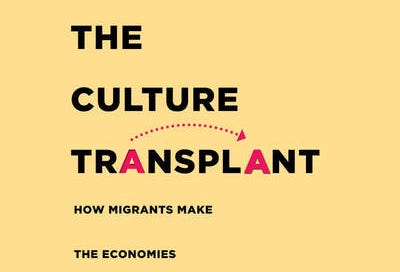My Reason review of Garett Jones’ The Culture Transplant: How Migrants Make the Economies They Move to a Lot Like the Ones They Left is now up. Though he’s strangely reluctant to name open borders as his target, the book is definitely the most intellectually impressive attempt to rebut the economic case for open borders yet published. And it’s beautifully written; the sentences sing.
Still, I’m dismayed by how little effort Garett makes to respond to any of my criticism of Deep Roots research, the trust-diversity connection, or his anti-immigration interpretation thereof. True, I only posted this criticism on my blog. In case you haven’t heard, though, econ journals virtually never publish critiques of earlier research, so blogs are virtually the sole available venue for this kind of work.*
Highlights from my review:
Yet Jones' evidence argues for radical liberalization of immigration: if not fully open borders, then at least 50 percent open borders—at a time when borders are somewhere around 2 percent open. Using Jones' hand-picked measure of cultural quality, immigration from all of the following countries to the United States would be, by his argument, a clear-cut cultural improvement: Algeria, Argentina, Australia, Austria, Belarus, Belgium, Brazil, Canada, China, Costa Rica, Croatia, Denmark, Estonia, France, Germany, Greece, Hong Kong, Hungary, Ireland, Italy, Japan, Latvia, Lithuania, Netherlands, New Zealand, Norway, Poland, Portugal, South Korea, Moldova, Russia, Singapore, Slovakia, Spain, Sweden, Switzerland, Thailand, Tunisia, Ukraine, the United Kingdom, Uruguay, and Vietnam. Using a slightly different cultural measure adds the 1.7 billion inhabitants of India and Pakistan to the list.
And:
The most restrictive immigration policy the research supports is: "Freely admit anyone who improves your country's Deep Roots." This isn't predicted merely to raise living standards in the receiving countries, but also to fuel global growth by filling the I-7 with high-potential workers. For most of the world's richest countries, this implies radical deregulation—especially for the United States, because despite our high living standards, our ancestry scores are mediocre.
Aside: I’m also surprised that Garett never does a horserace of national IQ against any of the allegedly “cultural” measures in the book. Very surprised, actually.
Read the whole review here.
* The only econ journal that welcomes critiques is Dan Klein’s Econ Journal Watch, which recently published Jason Briggeman’s deep dive into some leading Deep Roots papers. In fairness, this article probably came out too recently for Garett to address.

















Imagine a politician or agency saying, in the US context, "let in immigrants from these countries but not these other ones." Naturally, many people would say, "why?" The answer given would be "the cultural practices of people from these countries help the USA; the cultural practices of people from these other ones hurt the USA." Any such person or agency would be destroyed, and the policy ignominiously dropped.
Even saying having a policy like, "we need more migration from non-white countries", which would be very popular among leftists, would still probably not (?) poll well across the USA.
I bring this up, because if the liberal policy the deep culture research supports is a policy that would be demonized by both leftists (for being racist) and by rightists (for being too liberal on immigration), then it's not really clear (to me, anyway) that the deep culture research "supports" that policy.
This has always been my argument against open borders.
Most libertarians believe (a la Deirdre McCloskey) that cultural transformation was a key element in the "great enrichment." If you believe this, however, you cannot believe in open borders since not all cultures are equally compatible with the the type of economic/social/cultural characterists that produce economic success. And certainly allowing so many immigrants in that it begins to shift the successful culture of the receiving country would be foolhardy - the "melting pot" must not be overwhelmed. It also suggests that being selective in immigration is wise.
As Bryan points out, this argument is consistent with much greater immigration - probably on a merit or "points" basis, since a well-designed version will pick up the cultural preferences (in probably a more targeted way) without being political impossible - but it is not consistent with open borders. And that is exactly where we should come out as a country: much more immigration but selectively.